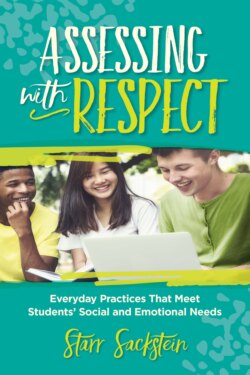Читать книгу Assessing with Respect - Starr Sackstein - Страница 11
На сайте Литреса книга снята с продажи.
Teacher-Student Relationships
ОглавлениеOften, even before the first day of school, teacher-student relationships are developing through word-of-mouth by students who came before. Teachers who are challenging to get along with are identified as such by reputation. Although I am not suggesting that we seek friendships with our students or that we shouldn't be firm in our expectations and demeanor, I am suggesting that what students experience in our behavior matters, especially if they are ever going to see us as allies and advocates for them. Of course, in our efforts to become better allies and advocates, we must recognize the thin line between the intention to help and the harmful idea of the "white man's burden"—the notion, derived from 19th century colonization, that it is white people's responsibility to "uplift" people of color.
Kids immediately size up the demeanor we project (and what we hope to accomplish by that demeanor). Teachers who seek to be seen as a "dictator" can expect students to fear them and, as a result, to not fully trust them. That isn't to say students won't appreciate the teacher's expertise or admit to learning from the teacher later, but rather that we need to strike a balance to develop good professional relationships with students, showing care and creating structure.
When we model how we would like students to be—honest, straightforward, engaged, and humane—students respond in kind. Taking time at the beginning of the school year to develop relationships with each student, beyond just knowing names, will increase the opportunities for personalized learning and ultimately increase learning over time.
